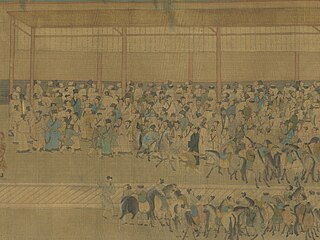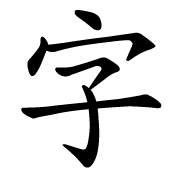During Emperor Wenzong's reign
Wei Mo passed the imperial examinations in the Jinshi class in 833, during the reign of Emperor Dezong's great-great-grandson Emperor Wenzong. When the official Yang Rushi (楊汝士) served as the prefect of Tong Prefecture (同州, in modern Weinan, Shaanxi), he invited Wei to serve as his secretary in his capacity as Tong Prefecture's defender. Later, when Yang was recalled to the capital Chang'an, he recommended Wei to serve as You Shiyi (右拾遺), a low-level advisory official at the legislative bureau of government (中書省, Zhongshu Sheng). Knowing that Wei was a descendant of Wei Zheng's, Emperor Wenzong treated him specially. He was also much favored by the chancellors Li Guyan, Li Jue, and Yang Sifu. [1]

Chinese imperial examinations were a civil service examination system in Imperial China to select candidates for the state bureaucracy. Although there were imperial exams as early as the Han dynasty, the system became widely utilized as the major path to office only in the mid-Tang dynasty, and remained so until its abolition in 1905. Since the exams were based on knowledge of the classics and literary style, not technical expertise, successful candidates were generalists who shared a common language and culture, one shared even by those who failed. This common culture helped to unify the empire and the ideal of achievement by merit gave legitimacy to imperial rule, while leaving clear problems resulting from a systemic lack of technical and practical expertise.

Emperor Wenzong of Tang (809–840), personal name Li Ang, né Li Han (李涵), was an emperor of the Tang dynasty of China. He reigned from 827 to 840. Emperor Wenzong was the second son of Emperor Muzong and younger brother of Emperor Jingzong. A rare occurrence in Chinese history, Emperor Wenzong, along with his elder brother Emperor Jingzong and younger brother Emperor Wuzong, reigned in succession.

Weinan is a prefecture-level city in the east of Shaanxi province, China. The city lies about 60 km (37 mi) east of the provincial capital Xi'an.
After the Ganlu Incident — an incident in 835 in which Emperor Wenzong and his close associates Li Xun and Zheng Zhu unsuccessfully tried to slaughter the powerful eunuchs — Li Xun's associate Li Xiaoben (李孝本), a member of the Tang imperial Li clan, was executed. Li Xiaoben's family members were seized to be servants in the army, but under Emperor Wenzong's orders, Li Xiaoben's two daughters were taken into the palace, leading to belief that Emperor Wenzong wanted to take them as concubines. Wei Mo submitted a petition in which he pointed out that even the suspicion that Emperor Wenzong would consider it — which would be a violation against Confucian regulations against endogamy — would appear inappropriate. Upon receiving Wei's petition, Emperor Wenzong immediately sent Li Xiaoben's daughters out of the palace, promoted Wei to the higher office of You Bujue (右補闕), and issued an edict in which he greatly praised Wei and compared him to his ancestor Wei Zheng. [4]
Li Zhongyan (李仲言), known as Li Xun (李訓) in 835, courtesy name initially Zixun (子訓), later Zichui (子垂), pseudonym Hermit Wang (王山人) during the mourning period for his mother, was an official of the Chinese dynasty Tang Dynasty. He became a trusted advisor to Emperor Wenzong and plotted with Emperor Wenzong to end the hold the powerful eunuchs had on power by slaughtering the eunuchs, but when the effort failed, Li Xun and his associates were slaughtered.
Zheng Zhu (鄭注), probably né Yu Zhu (魚注), was an official of the Chinese dynasty Tang Dynasty. He became a trusted advisor to Emperor Wenzong due to treatments he provided Emperor Wenzong for the emperor's illnesses, and thereafter plotted with Emperor Wenzong and Li Xun to slaughter the powerful eunuchs. However, after the plot failed, Li Xun and he were both killed, along with many other officials that the eunuchs suspected of being complicit.

Confucianism, also known as Ruism, is described as tradition, a philosophy, a religion, a humanistic or rationalistic religion, a way of governing, or simply a way of life. Confucianism developed from what was later called the Hundred Schools of Thought from the teachings of the Chinese philosopher Confucius, who considered himself a recodifier and retransmitter of the theology and values inherited from the Shang and Zhou dynasties. In the Han dynasty, Confucian approaches edged out the "proto-Taoist" Huang–Lao as the official ideology, while the emperors mixed both with the realist techniques of Legalism.
In 838, Wei was promoted to be an imperial chronicler with the title Qiju Sheren (起居舍人). [1] When Wei met with Emperor Wenzong to thank him, Emperor Wenzong asked him to submit Wei Zheng's old writing tablet. The chancellor Zheng Tan made the comment, "It was the man, not his tablet." Emperor Wenzong, however, responded, "I am requesting the tablet in the spirit of the poem Gantang [(甘棠)]." [5] (The Gantang was a poem in which the people of Zhou Dynasty memorialized the great early Zhou statesman Ji Shi (姬奭) the Duke of Zhao.) [6]
Zheng Tan (鄭覃), formally the Duke of Yingyang (滎陽公), was an official of the Chinese dynasty Tang Dynasty, serving as a chancellor during the reign of Emperor Wenzong. He was viewed as a Li Faction leader in the Niu-Li Factional Struggles.
In 839, Wei was given the additional title of Jianyi Daifu (諫議大夫), and continued to serve as Qiju Sheren. [1] On one occasion, Emperor Wenzong requested that Wei submit the records that he had written of Emperor Wenzong's acts, claiming that by reviewing them, he would be able to review his own actions. Wei pointed out that historians were supposed to record with honesty, and that if they had to be concerned about whether emperors would be pleased or not about the historians' views of their actions, the historians could not record with honesty. Emperor Wenzong relented and did not insist on viewing the records. [5]
During Emperor Xuānzong's reign
After Emperor Wuzong died in 846 and was succeeded by his uncle Emperor Xuānzong, Li Deyu, in turn, lost power, and Bai Minzhong became the lead chancellor. [7] Thereafter, Wei Mo was promoted to be the prefect of Ying Prefecture (郢州, in modern Wuhan, Hubei), and then moved even closer to the capital to be the prefect of Shang Prefecture (商州, in modern Shangluo, Shaanxi). In 848, he was recalled to Chang'an to serve as imperial attendant (給事中, Jishizhong), and then to be deputy chief imperial censor (御史中丞, Yushi Zhongcheng). While serving as deputy chief imperial censor, he submitted an accusation of corruption against Emperor Xuānzong's brother-in-law Du Zhongli (杜中立), [1] [8] which shocked the nobles and caused them to fear him. Later, he was made the deputy minister of census (戶部侍郎, Hubu Shilang) as well, and in that capacity was to serve as the director of taxation. He submitted a petition in which he pointed out that it would be inappropriate for him to oversee matters of money and continue to serve as censor, and by his request, he was relieved of his censor duties. [1]
In 851, Emperor Xuānzong made Wei a chancellor de facto with the designation Tong Zhongshu Menxia Pingzhangshi (同中書門下平章事), and continued to have him oversee taxation. At that time, Emperor Xuānzong was already relatively old (age 41), but had not designated a crown prince. Given his sensitivity about the matter, however, the officials largely did not dare to speak to him about the subject. When Wei met with Emperor Xuānzong to thank him for the commission, he took the chance to point out that that was the main worry that he had about Emperor Xuānzong's governance. While Emperor Xuānzong did not thereafter create a crown prince, the people at the time were nevertheless impressed with Wei. [9]
In 852, Li Ye (李業) the military governor of Hedong Circuit (河東, headquartered in modern Taiyuan, Shanxi) caused disturbances on the border by allowing the Han people to pillage the non-Han and also by killing those non-Han who had surrendered. However, Li Ye was not punished because he had backing of powerful people at court. Only Wei dared to submit an accusation against Li Ye, asking that he be relieved of his duties entirely; Emperor Xuānzong did not do so, but replaced Li Ye with Lu Jun (盧均) and transferred Li Ye to Yicheng Circuit (義成, headquartered in modern Anyang, Henan). [9]
While serving as chancellor, Wei was also in charge of editing the history of Emperor Wenzong's reign, and after he submitted a 40-volume history of Emperor Wenzong's reign, he and the key editors under him were rewarded. [1] It was said that while the chancellors spoke with Emperor Xuānzong on policy issues, they all spoke in roundabout manners in order not to displease the emperor, but Wei dared to speak his mind with no regard for the such. It was said that Emperor Xuānzong often commented, "Wei Mo acts in the same way his ancestor [(i.e., Wei Zheng)] did, and I respect him greatly." However, it was also said that because of this, Wei was resented by the lead chancellor Linghu Tao. In 857, Wei was therefore sent out of Chang'an to serve as the military governor of Xichuan Circuit (西川, headquartered in modern Chengdu, Sichuan, continuing to carry the Tong Zhongshu Menxia Pingzhangshi title as an honorary title. [9] In 858, when Wei grew ill, he requested to be replaced. Emperor Xuānzong was set to recall him to Chang'an to serve as the minister of defense (兵部尚書, Bingbu Shangshu), but Wei, citing his illness, requested an office with little responsibilities, and therefore was made acting You Pushe (右僕射) and advisor to the Crown Prince. [1] [10] He died in winter 858 and was given posthumous honors. [1]
Niu Sengru (牛僧孺), courtesy name Si'an (思黯), formally Duke Wenzhen of Qizhang (奇章文貞公), was an official of the Chinese dynasty Tang Dynasty, serving as a chancellor during the reigns of Emperor Muzong and his sons Emperor Jingzong and Emperor Wenzong. He was commonly regarded as the leader of one of the two court factions at the time — the faction later known as the Niu Faction — during the Niu-Li Factional Struggles.
The Niu–Li factional strife was an ongoing contention at the court of the mid-to late Tang dynasty. It is largely viewed to have started during the reign of Emperor Muzong, circa 821, but having its seeds in the events of his father Emperor Xianzong—between two court factions later to be referred to by Chinese historians as the Niu Faction (牛黨), named after Niu Sengru, which was largely viewed as a faction of officials from humble origins and who passed the imperial examinations to get into government; and the Li Faction (李黨), named after Li Deyu, which was largely viewed as a faction of officials from aristocratic origins. The two factions struggled for decades at court, during the reigns of Emperor Muzong and his sons Emperor Jingzong, Emperor Wenzong, and Emperor Wuzong. The struggles are viewed as having ended at the start of the reign of Emperor Wuzong's successor and Emperor Muzong's younger brother Emperor Xuānzong, in 846. His clear dislike for Li Deyu, and systematic demotion of related officials, led to the complete defeat of the Li Faction.
Li Zaiyi (李載義), né Li Zaiyi, courtesy name Fanggu (方谷), formally the Prince of Wuwei (武威王), was a general of the Chinese dynasty Tang Dynasty who, from 826 to 831, ruled Lulong Circuit in de facto independence from the imperial government as the circuit's military governor (Jiedushi), although he was respectful to Emperor Wenzong and participated in the imperial campaign against the rebel general Li Tongjie. After he was expelled in a mutiny by Yang Zhicheng, the imperial government continued to commission him as a military governor, and he served at two other circuits subsequently.
Lu Sui, courtesy name Nanshi (南式), was an official of the Chinese Tang Dynasty, serving as a chancellor during the reign of Emperor Wenzong.
Li Zongmin (李宗閔), courtesy name Sunzhi (損之), was an official of the Chinese dynasty Tang Dynasty, serving twice as chancellor during the reign of Emperor Wenzong. He was considered one of the leading figures of the Niu-Li Factional Struggles — factional struggles between two factions at the Tang court that lasted decades — as a leader of the so-called Niu Faction, named after his colleague Niu Sengru.
Li Deyu, courtesy name Wenrao (文饒), formally the Duke of Wei (衛公), was an official of the Chinese dynasty Tang Dynasty, serving as a chancellor during the reigns of brothers Emperor Wenzong and Emperor Wuzong and (briefly) their uncle Emperor Xuānzong. He was the leader of the so-called Li Faction in the decades-long Niu-Li Factional Struggles, and was particularly powerful during Emperor Wuzong's reign, dominating the court scene and guiding policies during the campaigns against the crumbling Huigu Khanate and against the warlord Liu Zhen. After Emperor Wuzong's death, Emperor Xuānzong, who had long despised him for his hold on power, had him demoted and banished, where he died in exile.
Jia Su (賈餗), courtesy name Zimei (子美), formally the Baron of Guzang (姑臧男), was an official of the Chinese dynasty Tang Dynasty, serving briefly as a chancellor during the reign of Emperor Wenzong. During Emperor Wenzong's reign, he became involved in a major power struggle between imperial officials and eunuchs known as the Ganlu Incident, and he was killed by the eunuchs along with three other chancellors, Li Xun, Wang Ya, and Shu Yuanyu.
Chen Yixing (陳夷行), courtesy name Zhoudao (周道), was an official of the Chinese dynasty Tang Dynasty, serving twice as a chancellor during the reigns of Emperor Wenzong and Emperor Wuzong. He was viewed as a Li Faction leader in the Niu-Li Factional Struggles.
Yang Sifu (楊嗣復) (783–848), courtesy name Jizhi (繼之), nickname Qingmen (慶門), formally Count Xiaomu of Hongnong (弘農孝穆伯), was an official of the Chinese dynasty Tang Dynasty, serving as a chancellor during the reign of Emperor Wenzong and (briefly) the reign of Emperor Wenzong's brother Emperor Wuzong. He was considered one of the leaders of the Niu Faction in the Niu-Li Factional Struggles.
Li Jue (784?-852?), courtesy name Daijia (待價), formally Duke Zhenmu of Zanhuang (贊皇貞穆公), was an official of the Chinese dynasty Tang Dynasty, serving as a chancellor during the reigns of Emperor Wenzong and (briefly) Emperor Wenzong's brother Emperor Wuzong. He was considered one of the leaders of the Niu Faction in the Niu-Li Factional Struggles.
Cui Gong (崔珙), formally the Duke of Anping (安平公), was an official of the Chinese dynasty Tang Dynasty, serving as a chancellor during the reign of Emperor Wuzong.
Li Shen (李紳), courtesy name Gongchui (公垂), formally Duke Wensu of Zhao (趙文肅公), was an official of the Chinese dynasty Tang Dynasty, serving as a chancellor during the reign of Emperor Wuzong. He was also noted as a poet.
Cui Xuan (崔鉉), courtesy name Taishuo (臺碩), formally the Duke of Wei (魏公), was an official of the Chinese dynasty Tang Dynasty, serving two terms as a chancellor during the reigns of Emperor Wuzong and Emperor Wuzong's uncle Emperor Xuānzong.
Du Cong (杜悰) (794?-873?), courtesy name Yongyu (永裕), formally the Duke of Bin (邠公), was an official of the Tang dynasty of China, serving two terms as chancellor during the reigns of Emperor Wuzong and Emperor Wuzong's cousin Emperor Yizong. He was traditionally considered a skilled politician who maintained his high position throughout his lengthy career, but not a capable chancellor.
Zhou Chi (周墀), courtesy name Desheng (德升), formally the Baron of Ru'nan (汝南男), was an official of the Chinese dynasty Tang Dynasty, serving as a chancellor during the reign of Emperor Xuānzong.
Linghu Tao, courtesy name Zizhi (子直), formally the Duke of Zhao (趙公), was an official of the Chinese dynasty Tang Dynasty. He was the leading chancellor during the last nine years of the reign of Emperor Xuānzong, but was removed from his chancellor position after Emperor Xuānzong's death, subsequently serving several terms as military governor (Jiedushi) in the circuits.
Zheng Lang (鄭朗), courtesy name Yourong (有融), was an official of the Chinese dynasty Tang Dynasty, serving as a chancellor during the reign of Emperor Xuānzong.
Yu Cong (于琮), courtesy name Liyong (禮用), was an official of the Chinese dynasty Tang Dynasty, serving as a chancellor during the reign of his brother-in-law Emperor Yizong. After the agrarian rebel Huang Chao captured the imperial capital Chang'an in 880 and established his own Qi state, he tried to recruit Yu to serve as his chancellor, but Yu refused and was executed.
Wang Duo (王鐸), courtesy name Zhaofan (昭範), formally the Duke of Jin (晉公), was an official of the Chinese dynasty Tang Dynasty, serving as a chancellor during the reigns of Emperor Yizong and Emperor Yizong's son Emperor Xizong. After the agrarian rebel Huang Chao captured the Tang capital Chang'an in 880 and forced Emperor Xizong to flee, Wang was commissioned by Emperor Xizong to serve as the supreme commander of Tang forces in the central and eastern empire, effectively serving as viceroy with full imperial authorities to issue edicts, and Wang was instrumental in the various Tang maneuvers, including persuading Li Keyong and Zhu Quanzhong to join the Tang cause, in defeating Huang. In 884, on his way to his new post as the military governor (Jiedushi) of Yichang Circuit, Le Congxun (樂從訓) the son of Le Yanzhen the military governor of Weibo Circuit, enticed by the group of women that accompanied Wang, ambushed Wang and killed him, taking the women captive.








